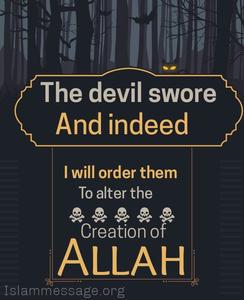
The Devil Swore: “And Indeed I will Order them to Alter the Creation of Allaah.”
Also from the things that Allaah has made forbidden for the women is to change the creation of Allaah, which the Devil swore that he would order the Children of Aadam to do:
“And indeed I will order them to alter the creation of Allaah.”
[Surah An-Nisaa: 119]
The interpretation of this verse that it refers to eyebrow-plucking, tattooing, teeth-filing, and hair extensions, has come to us in a hadeeth: “The Prophet cursed the woman who plucks eyebrows and the one who has her eyebrows plucked; the woman who extends hair and has her hair extended; and the woman who tattoos and has herself tattooed.” [15]
A Naamisah is someone who plucks the hair from the eyebrows with either a scissor or a razor blade or by removing it using any other method by which eyebrow hair is removed. This is what is known as an-nams (eyebrow-plucking) which the Prophet cursed any woman that did it. A Mutanammisah is a woman that asks for her eyebrows to be plucked. She is also cursed based on the statement of Allaah’s Messenger .
There are women that have been afflicted by this crime of plucking the eyebrows based on their following of the disbelieving women, lewd sinful women and ignorant women that do not care about disobeying Allaah and His Messenger . Then after they remove their eye-brows, they bring a color dye and draw lines in its place. O, how perfect Allaah is from all imperfections!! Are dyes better than eyebrows? Are they better than what Allaah has created?! This is altering Allaah’s creation. So it is not permissible for a Muslim woman to follow these evil practices and immoral customs, and change Allaah’s creation.
A Waashimah is a woman that draws tattoos, which is done by either sticking needles into the skin or slicing open the skin to the point that bloods comes out and putting in its place some dye or coloring until there remains green lines either on her hand or her face. This is washam, i.e. tattooing.
A Mustawshimah is a woman that requests that this be done to her. This is a form of changing and altering Allaah’s creation. By Allaah, which of the two is better the color of the skin, which Allaah created, or this deformed color?? Rather it is blind-following and obedience to the Devil in what he orders:
“And indeed I will order them to alter the creation of Allaah.” [Surah An-Nisaa: 119]
A Waasilah is a woman that attaches another set of hair to her own hair. This is deceptive and misleading. An example of it is when a woman puts on a wig or she adds pieces of hair to her own hair to the point that someone will think that this is how her hair is, when in fact it is someone else’s hair and not from herself. This woman is a Waasilah and she as well as the one who asks for this to be done to her are both cursed.
Likewise, al-washar means: Filing and making gaps in the teeth. “The Prophet cursed the women that make gaps between their teeth for beauty.” [16].This refers to the women that file their teeth and place gaps between them, thinking that this is from beauty when in fact it is obedience to the Devil. Washar is unlawful. As for fixing one’s teeth if there are defects in them and they need to be fixed, then there is nothing wrong with this since it is a form of treatment or a means of removing a deformity. As for teeth that do not have any flaws or disease, then it is not permissible for a woman to apply any form of filing, placing of gaps, and so on to them.
Notes:
15 Reported by Imaam Al-Bukhaaree (71/61 & 62) from the narration of `Abdullaah bin Mas’ood
16 See Saheeh Al-Bukhaaree (7/61 & 62) from the narration of `Abdullaah bin Mas’ood
Source for the above:
- Advice to the Muslim Woman – Shaykh Saalih bin Fawzaan al-Fawzaan [Book]
This book is a complete translation of a transcribed lecture from Shaikh Saalih Al-Fawzaan entitled: “Naseehah Lil-Mar’at-il-Muslimah” (Advice to the Muslim Woman). The source used for this translation was the book Muhaadaraat fil-‘Aqeedah wad-Da’wah, a large compilation of over 25 transcribed lectures from Shaikh Saalih Al-Fawzaan on issues of Creed and Methodology (vol. 3, pg. 281-299, Markaz Fajr, 2003 Edition)


